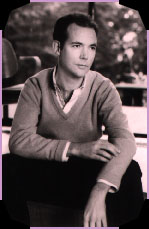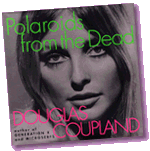
 Douglas Coupland
Douglas Coupland
interviewed by Mike Agger

I think the unspoken agreement between us as a culture is that we're not supposed to consider the commercialized memories in our head as real, that real life consists of time spent away from TVs, magazines and theaters. But soon the planet will be entirely populated by people who have only known a world with TVs and computers. When this point arrives, will we still continue with pre-TV notions of identity? Probably not. Time continues on: Instead of buying blue Chairman Mao outfits, we shop at the Gap. Same thing. Everybody travels everywhere. "Place" is a joke.
-- "Polaroids from the Dead"
Douglas Coupland is the author of "Microserfs" and "Generation X." His new book, "Polaroids from the Dead," is a collection of fiction and non-fiction pieces. Coupland filters Deadheads, Palo Alto, and Brentwood through his unique perspective, revealing the most recent past to be surprisingly quaint and distant. Tripod recently interviewed Douglas Coupland via email, asking him his thoughts on travel, mass media, and blue jeans.
Tripod: What kinds of places are you most interested in? Emerging tech centers? Decaying suburbs? All places?
Douglas Coupland: I tend to prefer locales where some dimension of infrastructural normality has been erased, eclipsed, magnified or distorted. I find that people within these landscapes alter to meet the environment.
Tripod: How do you like to go about picking up the particular riff of a locale?
DC: No real formula. I read a fair amount, books and papers (not so much magazines these days, and I don't know why.) I used to be into Antarctica. For eighteen months, I read everything I could on the place.
Tripod: Do you find that it is still relatively easy to find unique pockets of culture?
DC: I've never searched out unique pockets. I think the world is far less homogeneous than media think-pieces might have us believe. It flatters a certain type of mind to believe in pan-cultural uniformity.
DC: Manhattan.
Tripod: Why is it that driving in a car alone with the radio on is often more peaceful than any other possible state of being?
DC: I think I mentioned this in a book somewhere. I think it's because all the other cells of your brain that would be buzzing and whirring are all occupied driving the car, and the music sedates the remaining cells. I get lots of ideas driving. Also by being a passenger of the BC Ferries from West Vancouver to Nanaimo on Vancouver Island and back.
Tripod: What is the most decommercialized zone you have visited?
DC: Army bases or anything military. My dad was in the Canadian Armed Forces and for various reasons I've visited bases over the years. A million dollars would get you nothing there.
Tripod: In "Polaroids", you describe your struggle to separate commercial memories from personal memories. We remember ad jingles but forget the best name of our friend from summer camp. Is there a way to unplug ourselves (temporarily) from the commercial-media grid?
DC: In "Polaroids" there's a piece called "Power Failure." I'm sure you must have read it. Yes, you can unplug temporarily--and the very fact we recognize a *need* to unplug tells us that we're still okay people as a species. But once we've invented something, we're stuck with it forever.

DC: What I write is pretty well what percolates out of me. I don't plan things, and if I do, they don't work out. I just follow my instincts.
Tripod: Do you view your writing as archeological, as preserving cultural mores for readers in the 22nd century?
DC: Partly. I enjoy writing about places or situations that everybody considers 'beneath' writing about. Usually, the things people consider worth writing about are places or situations academia thought were groovy somewhere back in 1978. I mean, there all these people out there writing novels to impress their long-gone English 402 teacher. It's kind of strange.
Tripod: Could you imagine someone using "Polaroids" to rediscover the social customs of late twentieth century Deadheads?
DC: That's the future, so who knows. But it's the only writing about Deadheads I've ever seen that allowed access into their world for people who were maybe not *of* it. The straight journalistic pieces I've read were carbon copies of each other and had no texture. Stuff put out by the DH's themselves is impenetrable to those who don't "get it." I love that DH bumper sticker, "It's a Dead thing..."
Tripod: How quickly do you think the ways and means of people living in 1996 will become inscrutable to those living in the future?
DC: James Rosenquist (painter of F-111) once said that there's nothing more antique than something that happened seven years ago. If you think about it, it's kind of true. A corollary to this might be that mass amnesia begins setting in just past the 7-year mark.
DC: I'm not 100-percent sure what a snuff box is/was. The thing that always freaks me out is old photos of hotels and bars and there are *spittoons* in the corners. Back then it was perfectly acceptable to sit in the lobby of the Ritz Carlton, cough up a big lung-oyster, and glog it into a local spittoon. I mean, what was going through people's heads then?
Tripod: What place have you visited or lived that you felt was the furthest back in time you have ever traveled?
DC: The forests out back behind where I grew up (and still live) [ed. Vancouver]. You cross that fence and *whammo*, you're in ten million BC.
Tripod: Is there anyway for us to know that we have lost an earlier version of ourselves? That we have been upgraded, that we are no longer v.1.0 but now v.1.1?
DC: Small things. For example, everybody reads "Mad Magazine" growing up, but then there's that one day when you're at the magazine rack and you decide not to get it. That's a trivial answer. On a wider scale I've noticed that people don't change as a result of something happening often for years. Upgrading and maturation is subversive and glacial, but it always wins.
Tripod: You discuss the idea of an "accelerated culture." Have you found a way to slow down time, to get a full day out of the seconds?
DC: Travel all the time. Never wake up in the same bed twice. Meet too many people.
Tripod: This question was inspired by the fact that I lost my watch. It surprised me how often I looked down at a blank wrist during the day.
DC: I've never worn one.
